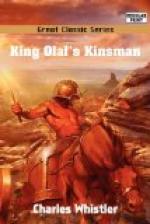But the words of Streone prevailed as ever, and the council broke up, and the nobles fell to feasting, while this foolish message was sent to Swein’s veterans in their towns.
Then Sigeferth and Morcar made no secret of their belief that Streone was playing into Cnut’s hands for reasons of his own. Wherefore Streone sent for them in friendly wise, as if to recall his words, and they went, and came from his house alive no more. Then their men went to avenge their lords’ deaths, and were driven into St. Frideswide’s church, and that was burnt over their heads.
“Now the seven boroughs will welcome Cnut,” said Ulfkytel, “and Lindsey looks for him; so he has a clear road into the heart of England.”
Then I saw that Streone surely wrought for Cnut, else was he a more foolish man than was thought, for all held him as the most skilful at statecraft in England.
Then said Ulfkytel:
“Utred has gone to mind his own land, and I have come to ask you to help me in East Anglia.”
And in the end it came to pass that Olaf gave his new fleet into the hands of the London thanes, for Ethelred seemed to care nought for it, and took his own ships only, and we sailed first of all to Maldon. Little trouble was there, for the Danes who held the place submitted, being too few to fight us, and we gave their arms to the citizens, and mounted all of our men whom we could, and so left the ships and marched towards Colchester, along the great road that I had last passed as a fugitive in the years that seemed to me so long ago.
It was strange to me as we went, and the mist of time seemed to pass away, so that all began to be as plain to my mind as if that flight had been but yesterday. There was nothing of the wayside happening that I could not remember well.
But all the roadside was changed, for the cottages were gone, and the farmsteads stood no longer in the clearings. I know not what tales of terror I might have heard concerning the burnings of these homes. Where the thralls’ huts had been were but patches of nettles and docks hiding heaps of ashes, and the farmhouses were charred ruins. And we saw now and then a man, skin clad and wretched, seeking shelter in the woods in all haste as we sighted him. But I had no need to ask aught—I knew only too well what manner of tales might be told here, as everywhere in Swein’s track.
As we drew nearer Colchester, and the village folk began to learn who we were, and so would gather with gifts for the good-natured Norsemen who came to release them from the tyranny of the thingmen, now and then a face that I knew would start, as it were, upon me from among a little crowd. But none knew me, nor were they likely to do so. Hardly could I think myself the same as the careless boy who had watched his father ride away to the war. Indeed, I know that I changed less in the ten years that came after this than in the four that had gone by since that day. For in those four years I had become the hardened warrior of many defeats and but this one victory.




